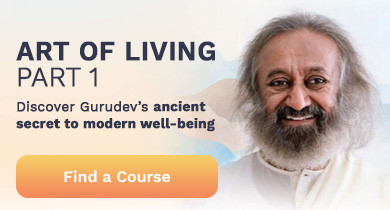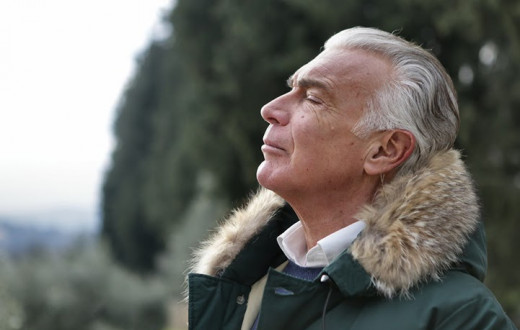By Gurudev Sri Sri Ravi Shankar┃Posted: December 03, 2018
Divine love manifests in eleven different types. Though divine love is only one, you can see it in eleven different forms.
Talkative praising
In order to praise something, you need an intense feeling of love inside. Have you noticed when you’re crazy about something, that you talk about it, talk about it, talk about it, talk about it? Like, when someone has fallen in love with somebody, then they always talk about them, talk about them, talk about them, talk. This is the first manifestation.
So when you’re crazy experiencing divine love, a sign of it is in the form of praise, seeing all qualities of the divine. You won’t feel that any amount of praising is sufficient or that you’re done. Just a mild interest cannot evoke such amount of praise.
That’s why I said you have to be crazy to praise so much, so much, so much. That’s a sign of divine love. One would go on praising continuously, nonstop, non-ending, and still one feels, “Oh, it’s not sufficient. I have to do it more, more, and more.”
Form
The second type is form: deep interest in the form, though God has no form. That’s what we’ve all seen. God is all-pervading. He has no physical form. There’s no form to the divinity, but it’s expressed in forms. Another manifestation is love for the form of the divine.
The divine loves form. That’s why millions and millions of forms are present in this creation. Even if you’re aware of the formless nature of divinity, a form makes it more interesting. It kindles the love in your heart.
Whenever you open your eyes, you see forms, deal with forms. All your life, even when you’re sleeping, forms appear. That’s what dreaming is. Except during very deep sleep and very deep meditation, forms keep appearing in your mind. The mind is used to it. So love for the form of the divine is natural for the mind.
Expression of gratitude: puja
The third one involves worship, honoring, offering, and offering one’s self. Whatever you love, you want to possess it. And in the process of possessing, you bring ugliness to that beauty. You make the beautiful thing ugly. Your expression gets distorted.
Worship is contrary to that. Whatever you appreciate, adore, and recognize the beauty of, you worship. Worshipping is just the opposite of wanting to possess. Nature is worshipping you. God is worshipping you in so many forms. So a puja is a replica of what nature does to you. A sense of giving, offering, is one of the expressions of divine love.
Memory
That memory comes again and again. It’s not that you make an effort to remember the divinity or divine love. As soon as you wake up, the first thought comes about the divinity, the loved one. If you have loved anyone, you know how the thought of him or her comes and keeps coming. You don’t make any effort to think about the beloved. But the thought constantly comes, you remember, and you go deep into the silence within you. That becomes meditation. Deep interest in meditation or remembrance is one of those qualities that happens.
Service
One form of expression of divine love is humbleness and service, as one’s nature. Not even the thought comes, “I’m doing some service.” You can’t but do it. Even if one wants to try to abstain, one can’t. One finds oneself back into it. Love gets expressed as service.
Authority
You know what brings authority? Being a servant does. A perfect servant has total authority and responsibility. A caretaker, a servant, has full authority over the home. If the master is away, he acts as the master. He gets that authority.
A servant is one in whom the master has bestowed his trust. Being a servant is to acknowledge the fact the divine has bestowed this trust. It has given one this job to carry on. So it’s my job; it’s not somebody else’s job. All the prophets have spoken with that authority, because their love for the divine was so deep.
This is strange mathematics. If you don’t want to be a servant, you can never be a master. If you don’t want to be a disciple, you can never be a guru, a master. The first qualification is this, being a servant.
A dear friend
Making the divine your dear friend. To someone above you, you may have a lot of respect but there may not be love. You can have respect, and honor them, but your heart may not start speaking. In such cases, the master will come and put his hand around you, “Come on, what is it? What is the matter? How are you doing? What is happening? Open up.”
This is love expressed in the form of a friend, companion. Friendliness means playfulness. The wisdom is not preached to you in a very serious manner, but in a playful manner. To me, a friend is one who plays.
As one’s beloved
Divine love manifests as one’s life partner. The purpose of a life partner is to rejoice, share life, and talk to someone on whom you can depend. The divine is the only really dependable relationship, an unchanging, total relationship. So when that longing is there, remember the divine could be in the form of your life partner, too.
Making the divine one’s life partner brings you companionship. If you could make the divine your life partner, loneliness won’t ever come. You’ll get more centered. Otherwise, you keep hanging onto your relationship, with whomever you’re having that relationship or companionship.
Mother and child
Another form of love is mothering the divine, seeing the divine as a child. This attitude is also in you naturally. Anyone whom you love, you immediately nurture, feed and take care of them. Motherly affection, parental affection, you give to the divine. You love the divine as your child, as having been born out of you. “Oh, it’s mine.” You adopt a sense of belonging, and this has all these qualities of magnanimity, and you start dissolving and caring for that magnanimous love.
Offering your life
With wisdom and experience, when one sees and looks at life, one says, “Even if this life can be only a flower on the path of the divine, it’s worth it. This life is offered and belongs to the divine.” Completely offer your life. That very moment, worries disappear. You won’t start manufacturing problems to fret about. You’ll smile through all situations.
Missing the divine
Missing the divine shows how deeply you’re in love. This is the last and most supreme manifestation— the intense, unbearable longing. And you’ll see that as it becomes more intense, that intensity of longing flips over and becomes bliss. You become immersed totally in the divine. Many of you have experienced intense longing, and at some point that longing becomes a joy. And that very longing itself becomes blissful and so enjoyable.
This is an excerpt from Sri Sri Ravi Shankar’s commentary on Narada’s Bhakti Sutras – You can read the entire book here:






























